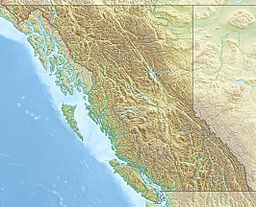The Satah Mountain volcanic field is a long chain of volcanoes in British Columbia, Canada. It stretches from south of the Itcha Range to northeast of Nimpo Lake. This volcanic area is part of the Chilcotin Plateau. It's also a section of the larger Anahim Volcanic Belt, which has been active for millions of years, from the Miocene to the Holocene epochs. The chain gets its name from its highest point, Satah Mountain, which is about 35 km (22 mi) northeast of Nimpo Lake.
What is the Satah Mountain Volcanic Field Made Of?
The Satah Mountain volcanic field has different types of volcanic features. You can find lava domes, which are like sticky, rounded piles of lava. There are also cinder cones, which are cone-shaped hills made from volcanic ash and rocks. And of course, there are lava flows, which are streams of molten rock that cooled down.
The lava domes and flows are mostly made of a rock called trachyte. The cinder cones are made of basalt and trachybasalt. These are all types of volcanic rock.
Scientists have studied the age of these volcanoes. The newest cone looks very fresh, almost like the 7,200-year-old Nazko Cone found further east in the Anahim Volcanic Belt. However, other studies show that the youngest part of the Satah Mountain volcanic field is a volcanic plug (a rock formation created when magma hardens inside a volcano's vent) that is about 1.43 million years old. This plug is made of a rock called basaltic trachyandesite.







